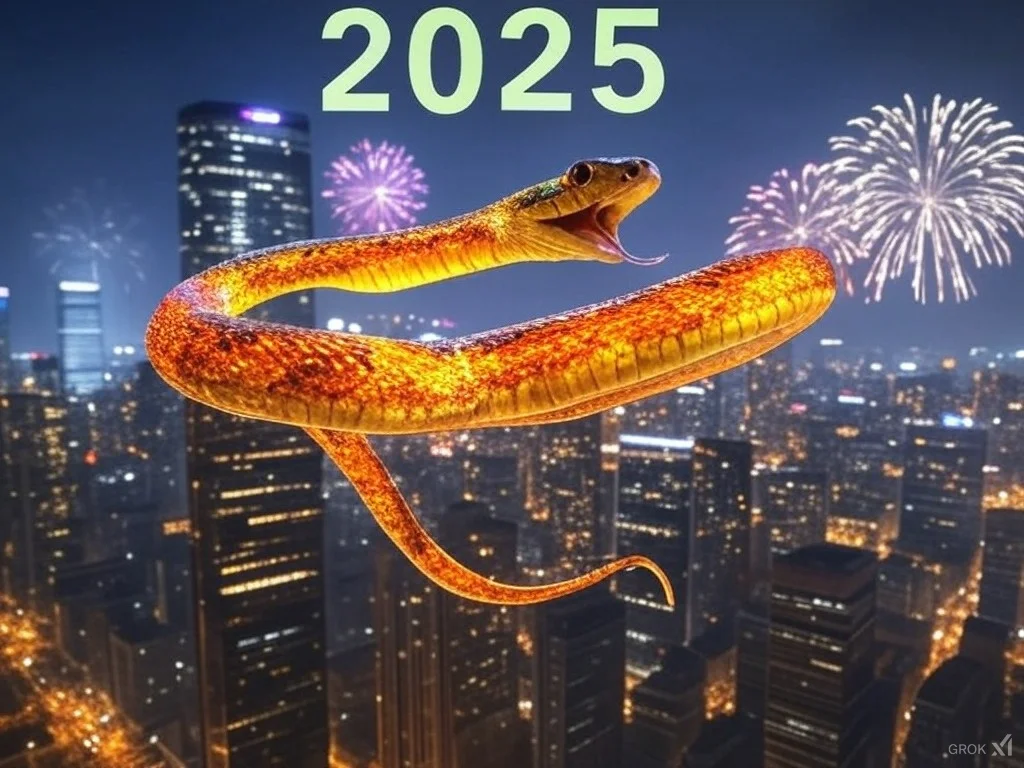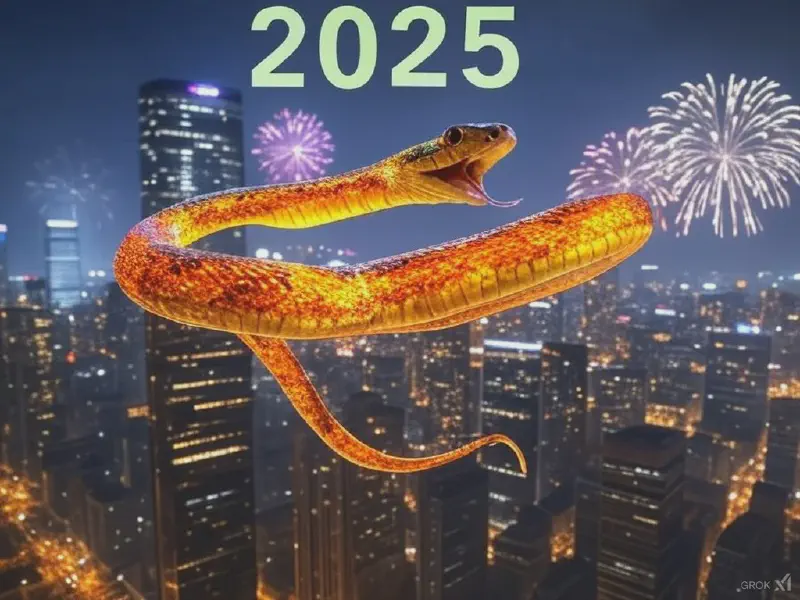After one-twelfth of 2025 had passed, I finally found some free time to hastily pen this article titled “Year-End Summary.” The past year was even more challenging than 2023, and like in previous years, I was full of ambition, experienced repeated failures, groped alone in the dark night, and saw stars twinkling under the dark sky. In the end, I can only conclude with the phrase, “Joy turns to sorrow, and the cycles of fullness and emptiness are predestined.(兴尽悲来,识盈虚之有数)”
Code Records
In 2024, I made 112 contributions on GitHub, an increase compared to 2023. This year, I submitted some UI designs that came to me in moments of inspiration, as well as some code infused with the wisdom of ChatGPT. Additionally, I uploaded the source code of this blog to GitHub.
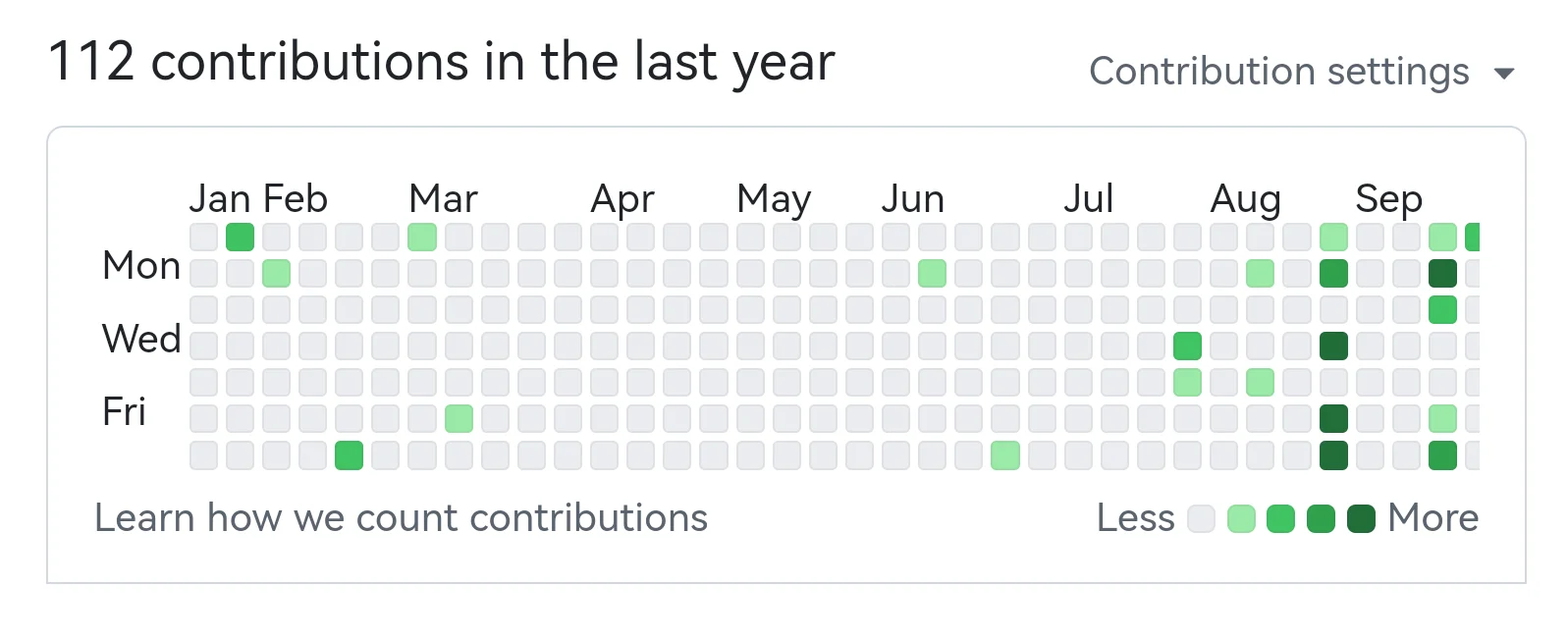
In 2023, I changed the themes of Typecho repeatedly. In 2024, with the registration of a new domain, I finally switched the blog system to the more user-friendly Hugo. After referencing a lot of materials, I managed to complete the blog deployment and data migration just before the start of the school term. It’s likely that I will continue using Hugo for my blog system for a long time. If I have more free time this year, I hope to learn about the Hugo theme development process and create a theme that best suits this blog.
Be a Person with Poetry in Your Heart
In late January, along with several student representatives from my school, I attended the award ceremony for the “Kunpeng Youth Science Fiction Literature Award.” When we first entered the venue, there was still some time before the ceremony began. A group of carefree elementary school students were making a lot of noise in front of us, and the organizers were endlessly playing promotional videos on the big screen. The noise was overwhelming, and I felt quite unsettled.
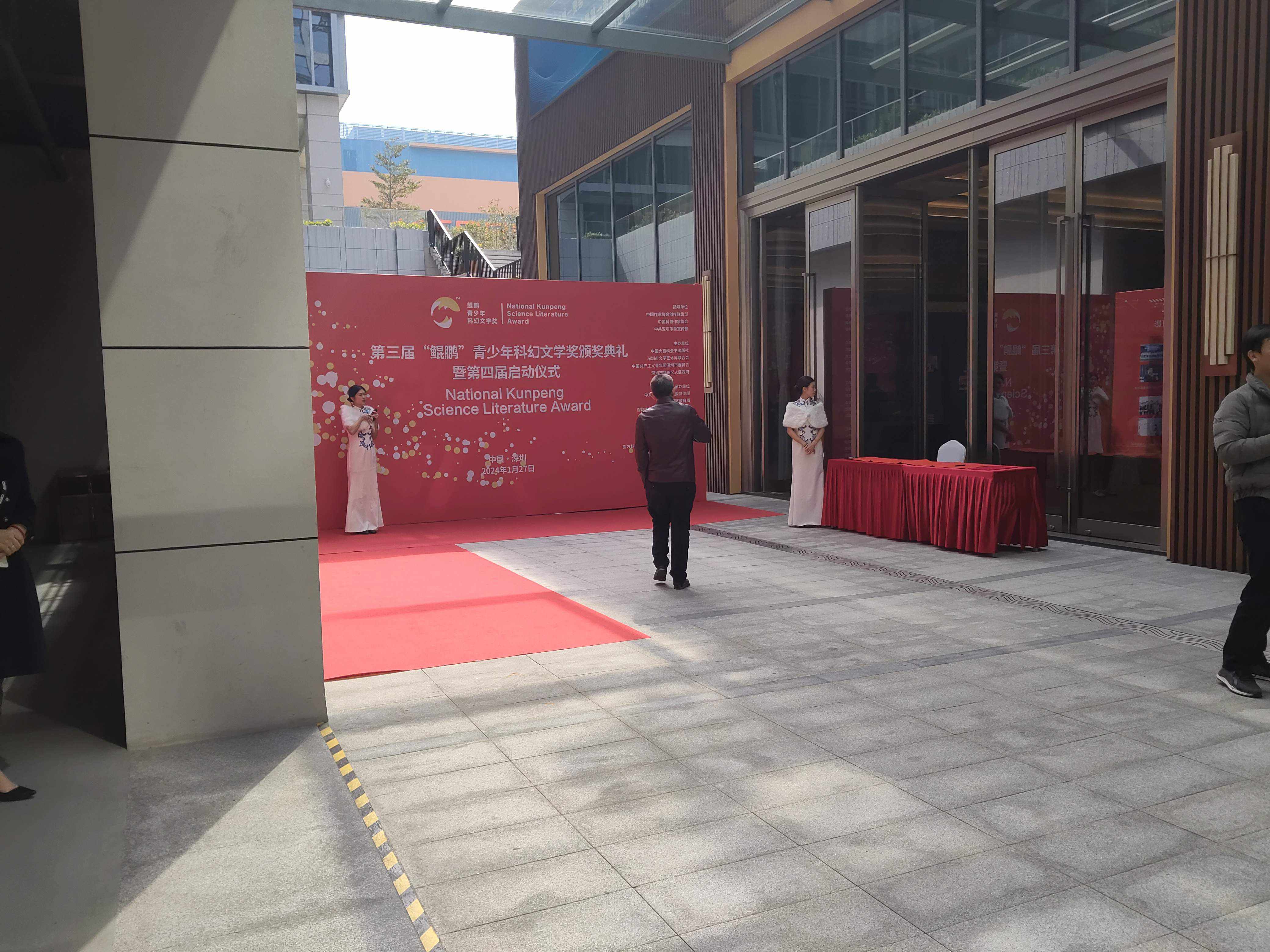
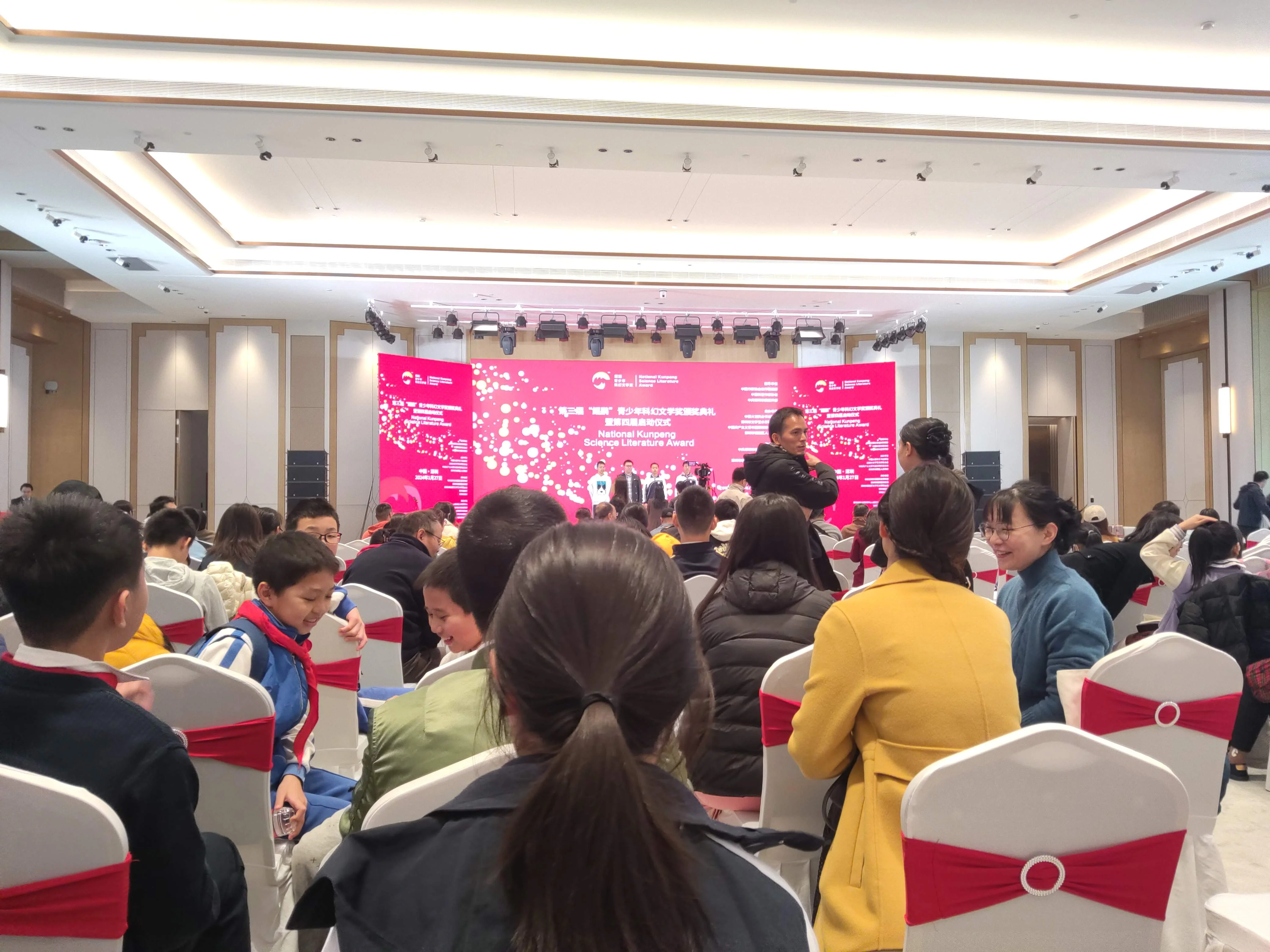
It wasn’t until after the award ceremony, when the winners gave their acceptance speeches, that the atmosphere became slightly more relaxed and enjoyable. I remember one winner passionately stating: “Science fiction literature is a profound reflection on science and humanities. A great science fiction work can guide the direction of the future.” I believe that a thought-provoking science fiction work needs to have a “dual perspective,” looking into the future while being rooted in reality. It must use a “telescope” to gaze at the stars and a “microscope” to dissect human nature; it requires both the imagination to look up at the stars and the insight to stay grounded in reality. As one winner demonstrated in his work: excellent science fiction never indulges in pure fantasy but instead merges quantum physics with humanistic philosophy into a tool for reflecting on reality.
As the year drew to a close, six representatives from our grade were selected to participate in a district-level essay competition, and I was fortunate to be one of them. When the competition began and I saw the high school group’s topic, “My AI Friend,” I was taken aback. Writing an argumentative essay, obviously…No; writing an expository essay explaining the principles of ChatGPT, discussing the training of DeepSeek, and then digressing to Transformer… the judges wouldn’t understand, so that’s a no. Writing a narrative essay—should I write about my user experience? It’s hard to make it stand out, so that’s also a no. This is not acceptable, that is not acceptable, after much deliberation, nothing seems acceptable. In the end, I submitted a “poorly” written science fiction piece.
On the way back, it was already evening, and only then did I notice the pale yellow moon rising. I asked a classmate from the literature club how she felt. She replied that she used to love literature, but spending two and a half hours writing an essay was utterly exhausting.
After that, we returned to school the same way we came. Outside the window was the November wind, scattering dust aimlessly in the sky. The Tyndall effect was at play, and the traffic under the sunset formed a yellow band of light, somewhat reminiscent of the imagery in García Márquez’s La luz es como el agua —a piece that once appeared in our Chinese practice exercises. Having just finished writing, my mind was foggy, thoughts scattered, and my heart seemed filled with mixed emotions, a faint sense of melancholy.
Suddenly, I recalled a line from “Dead Poets Society”: “The herd goes on, unthinking, the city filled with folly. What’s the point of living in it? Self? Life? The answer is because you exist, an irreplaceable existence.”
It feels like living in a highly developed information age, we’ve all been worn down by life, like the frayed edges of a new piece of clothing that inevitably gets worn out no matter how carefully you wear it. No matter how sharp we once were, we can’t withstand the inner admission of “I can’t do it.” Those ideals we once thought were within reach now seem like distant “poetry and faraway places”… We’ve never been so acutely aware of the gap between ourselves and our peers, between the past and the present, between ideals and reality… Our thoughts have matured, our horizons have broadened, sometimes we become more cynical, more self-deprecating—we know we’re on an inevitable path, but every step hurts. Our generation is like a sweater thrown into a washing machine, tumbling repeatedly in the spin cycle of high school academics, the rinse of exam rankings, and the drying program of six hours of sleep, only to come out pilled and misshapen, yet we still have to iron ourselves out the next morning, pretending to be the latest model in the shop window.
Even if we admit to repeated failures, we can’t lose the confidence to keep fighting. Even if we detest the prison built of steel and concrete, it doesn’t stop us from changing ourselves first, enriching our own lives.
Previously, I read an article on a classmate’s public account, with an illustration that read, “We don’t need to be poets, but we need to be people with poetry in our hearts.”

Modern people emphasize “having poetry in our hearts,” essentially resisting a collective sensory numbness. I’ve observed people commuting on the subway: similar glowing phone screens, similar tired expressions, like uniformly formatted data packets transmitted through fiber optics. If someone were to notice their reflection in the window glass or get lost in a physical book, that…The state of a moment is the most genuine poetry in one’s heart. This ability is not a superficial appreciation of beauty like the wind and flowers, but a defense mechanism to prevent oneself from being “alienated” into a vassal of capital.

Before the summer vacation, a senior returned to school as a young writer to give a lecture. After the lecture, I rushed to the front, first “mundanely” asking for her autograph, and then inquiring about some doubts I had regarding literary creation. During our conversation, she recommended the poetry collection of poet Jibing Wang. to me. His poems sprout from real life, carrying ideals while being grounded in reality, with a touch of realism. I remember meeting a classmate from the neighboring class at the beginning of high school, who brought his father’s collection of Guo Moruo’s poems to school to savor during leisure time; last year, while writing a travelogue during a study trip in Changsha, I accidentally discovered a “treasure” “Youtuber” on Bilibili who spreads the art of poetry… I realized that most people’s hearts are still filled with poetry. Of course, true poetry is not merely about being able to write, read, or appreciate poetry and prose, but more about a reconstruction of survival aesthetics in the fight against modern materialistic society.
The real dilemma our generation faces is that even “emptying the mind” has become a skill that needs to be learned. Various platforms teach so-called meditation, mindfulness, and spiritual healing, turning rest into a new KPI. Having poetry in one’s heart allows one to be “aimless”—even without producing any quantifiable value, it can give time a texture.
The Future Has Arrived
In 2017, when Google researchers designed the Transformer, they might not have imagined that this model would become the progenitor of future general artificial intelligence (AGI). In 2022, when I first learned about a company named “OpenAI” in the United States developing a chat model, I was still worried about not finding a suitable platform to register for a ChatGPT account.
In 2024, a host of AI video generation tools emerged, with Qwen 2.5 and DeepSeek models dominating the scene. I have deployed these models on my class’s computer via Ollama for retrieving information and querying data during offline periods.
I remember in middle school, when encountering difficulties, I mostly chose to ask classmates or teachers for help, or to search on Baidu or Google; now, when faced with doubts, asking Doubao or ChatGPT can provide relatively accurate answers in a short time. The original and universal process of knowledge transfer and thinking training has been completely washed away in the torrent of AI. After opening a certain AI dialogue webpage, our thinking patterns and cognitive paths have quietly changed.
Based on this, some might worry that artificial intelligence will cause unemployment, widen the wealth gap, and constrain people’s thinking. These concerns are reasonable, but we must not exaggerate them. Artificial intelligence is a useful tool; “the gentleman uses things, not be used by things.” Artificial intelligence is not scary; what is scary is…It’s not the inability to think independently that’s frightening, but the lack of common sense. Throw a complex question at DeepSeek r1, and it can outline a theoretical framework in less than a minute. Yet, when I delve into deep analysis myself, perhaps due to disuse, I feel like I’m on the verge of losing the ability to think deeply. When we outsource “finding answers” to AI, we might also be quietly relinquishing our ability to “construct questions.”
However, from another perspective, AI actually breaks the traditional boundaries of cognition. We can transcend time and space, accessing a vast amount of new knowledge anytime, anywhere. Faced with this new technology that is completely transforming the world, the key is to stay alert: treat AI as a “search engine Pro” rather than a “brain extension.” For humans, we cannot replace thinking with AI; instead, through questioning and probing AI, we can stimulate deeper cognition.
Will AI replace some human jobs? Yes, but most professions won’t abandon humans due to AI’s high efficiency. As technology advances, the highest quality creations increasingly require transcending instrumental rationality. When AI breaks down technical barriers, human creativity is pushed into more core areas: the delicate perception of existential experiences, the tolerance for cognitive chaos, and the primitive rebellious spirit that persists despite the constraints of tools. Perhaps, future creators will be those who can harness AI yet deliberately leave a personal touch, adept at using algorithms yet determined to create surprises. When I first tried Stable Diffusion, MidJourney, Pika, and Suno AI, I wondered if everyone could become a digital artist in the future. But soon, I realized I lacked “creative inspiration.” Even after admiring many others’ creations, I often wasn’t clear about what I wanted to create. Therefore, even if future AI possesses incredibly powerful painting and music creation abilities, it’s likely that only a few will truly become painters and musicians. Similarly, even if AI can program, it doesn’t mean everyone can become a programmer.
Reflecting on the Past, Sighing at the Present
In 2024, I read Xin Qiji’s “Partridge (鹧鸪天)” which perfectly encapsulates my state of mind this year.
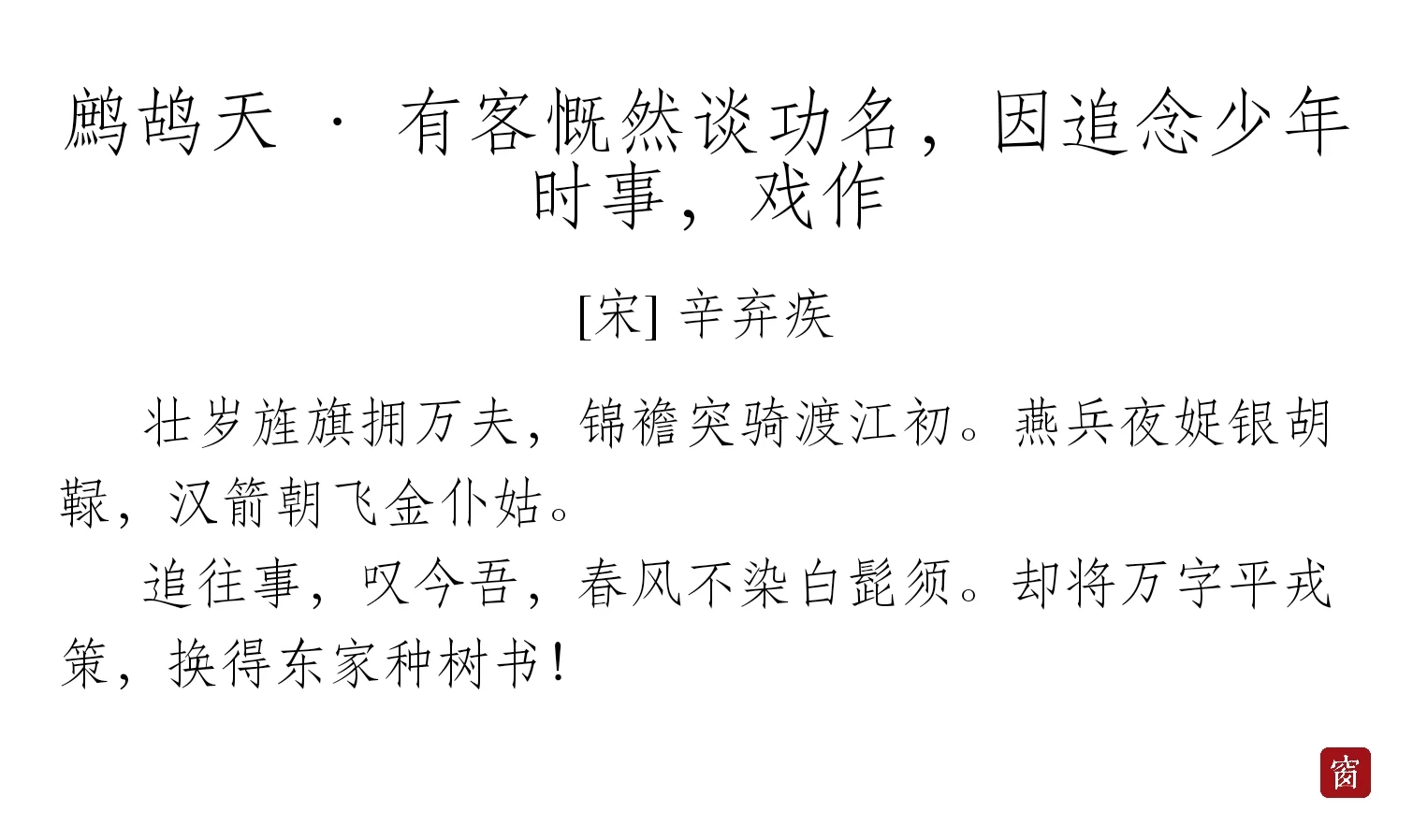
In youth, I led armies, banners unfurled,
Riding forth with armored troops to cross the rivers’ swirl.
By night, Yan’s soldiers polished their silver bows,
At dawn, Han’s arrows flew to fell the enemy’s throes.
Reflecting now, on past glories and dreams,
I sigh at my white beard, untouched by spring’s gleam.
Once, I held strategies to bring peace to the land,
But now, I trade them for a neighbor’s book on planting trees by hand.
At the age of twenty-three, Xin Qiji led fifty cavalrymen straight into the enemy camp, captured the traitor Zhang Anguo on horseback, and raced south overnight to present the captive in Jiankang. This legendary experience, more than forty years later, condensed into the line “In my prime, banners and flags surrounded ten thousand men” in “Partridge Sky.” But by then, Xin Qiji had transformed from a young general wielding a spear into an old man planting trees. When the peace faction regained control of the court, the once leading figure of the war faction penned his most poignant lament.
Half of high school has already passed. In the first year of high school, I fully realized that high school life is vastly different from the “idyllic” life of middle school. In middle school, I prided myself on being open-hearted and talented, yet time flies, and youthful arrogance quickly becomes a thing of the past, making one sigh at how swiftly time passes. In high school, I am single-mindedly…Striving for Progress. Despite being endowed with talent and ideals, my actions are often hasty and rushed. Judging solely by the rankings in exam results, I am some distance away from the goals I set long ago. There are reasons for this; for instance, my English scores lag significantly behind my classmates due to a lack of vocabulary. The consequences of not studying English diligently in the past have finally exploded a year later. Now, it seems, “The road ahead is long and winding; I will seek far and wide!(路漫漫其修远兮,吾将上下而求索)”
Since entering high school a year ago, I have participated in numerous group activities, and even the high school’s official WeChat account has mentioned me in several posts. I prefer to face life with an optimistic attitude, hoping that the future me will carve out a clear path for the current me. Unfortunately, in our youth, we always feel that the world is vast and full of possibilities. Yet, as we go through the daily grind, setbacks, and conformity, we gradually lose our curiosity for new things. We increasingly crave comfort, lose our pride, and the passion, bravery, and vitality that once surged in our blood when we were cynical.
In summary, the first year of high school has been a mix of high aspirations, repeated failures, solitary explorations in the dark, and moments of seeing stars twinkle in the night sky. Beyond that, I still have beautiful memories and poignant regrets, like the moon appearing and disappearing over the school building at dusk, or the spring light outside the dormitory balcony occasionally rippling in my heart. With such experiences, I must admit that this high school I chose has indeed shaped and changed me, exerting various influences on me. Therefore, I cannot say that my three years here are meaningless; the meaning is already embedded in my own story, and perhaps, the story itself is the meaning.
On a new page of my life, I will write these words:
“Your life is ultimately yours. You must be independent, experience, and defeat yourself before others can defeat you. You must build your own nest with your own hands and have the courage to burn it down when necessary. Because true growth often begins with a self-revolution. Be as proud as a phoenix—refusing to perch on anything but the paulownia tree and drink from anything but the sweet spring. Learn to embrace the painful fires of rebirth, for they are both destroyers and nurturers. In the flames, you will find your truest self.”
So be it, my heart is bright, what more is there to say? I am part of the most vibrant generation of youth in the country. Even if times are tough, even if tigers roar and apes cry, as a young person, I am destined to turn my blood into a sword. I wish to dedicate my life to serving the country; why should I need to enter the Jade Gate alive?(愿得此身长报国,何须生入玉门关?)
Finally: Happy New Year!
